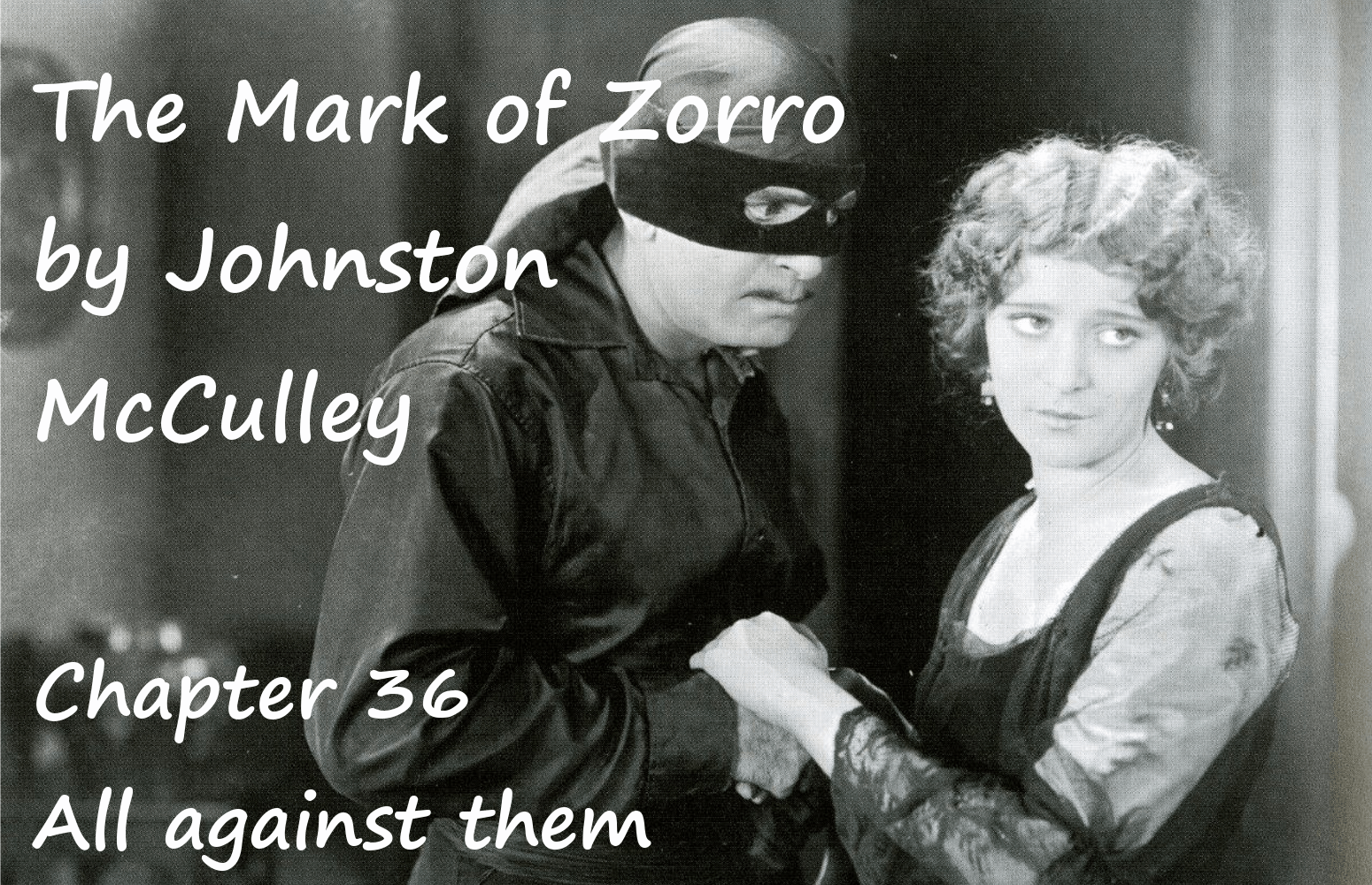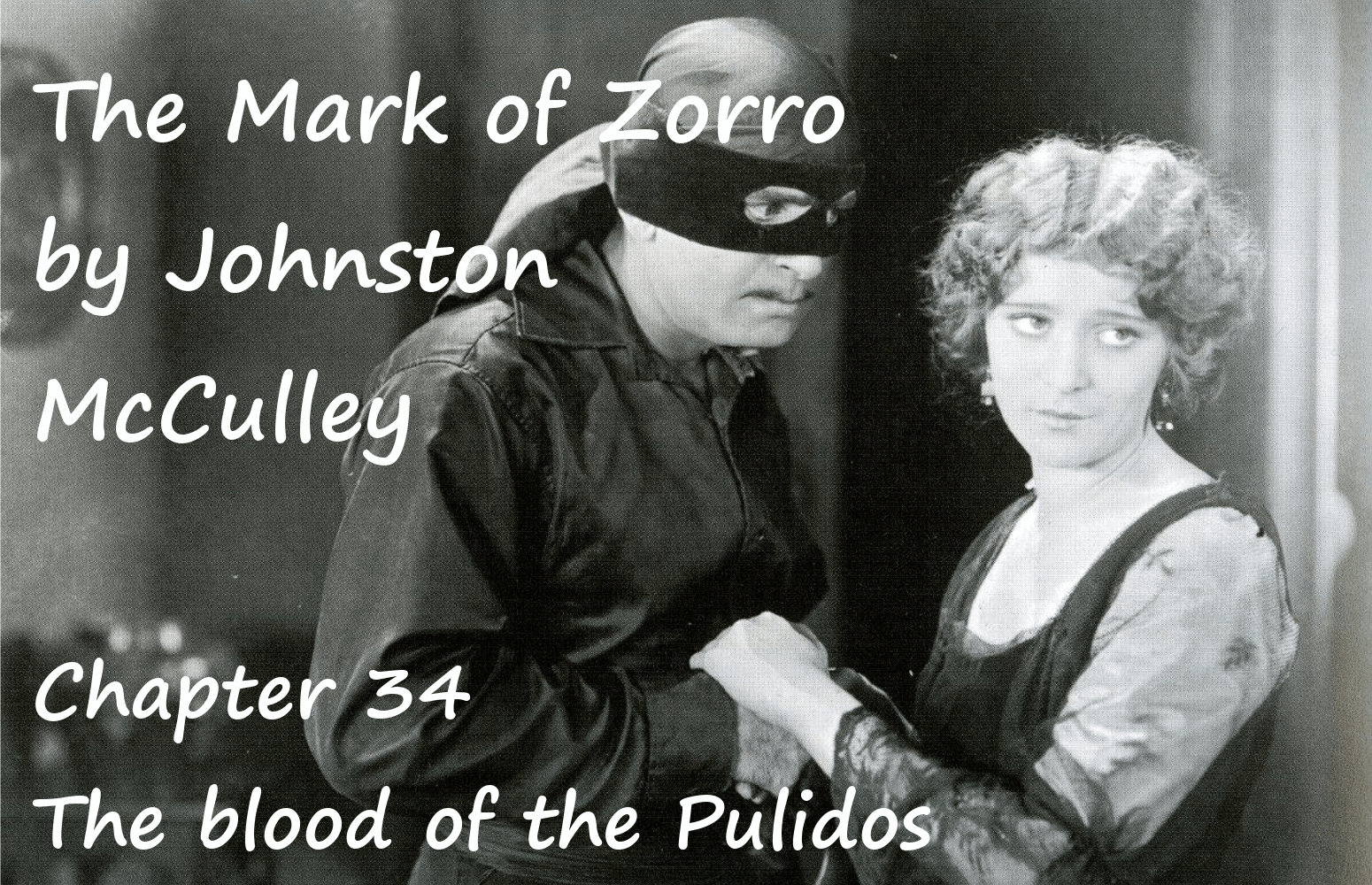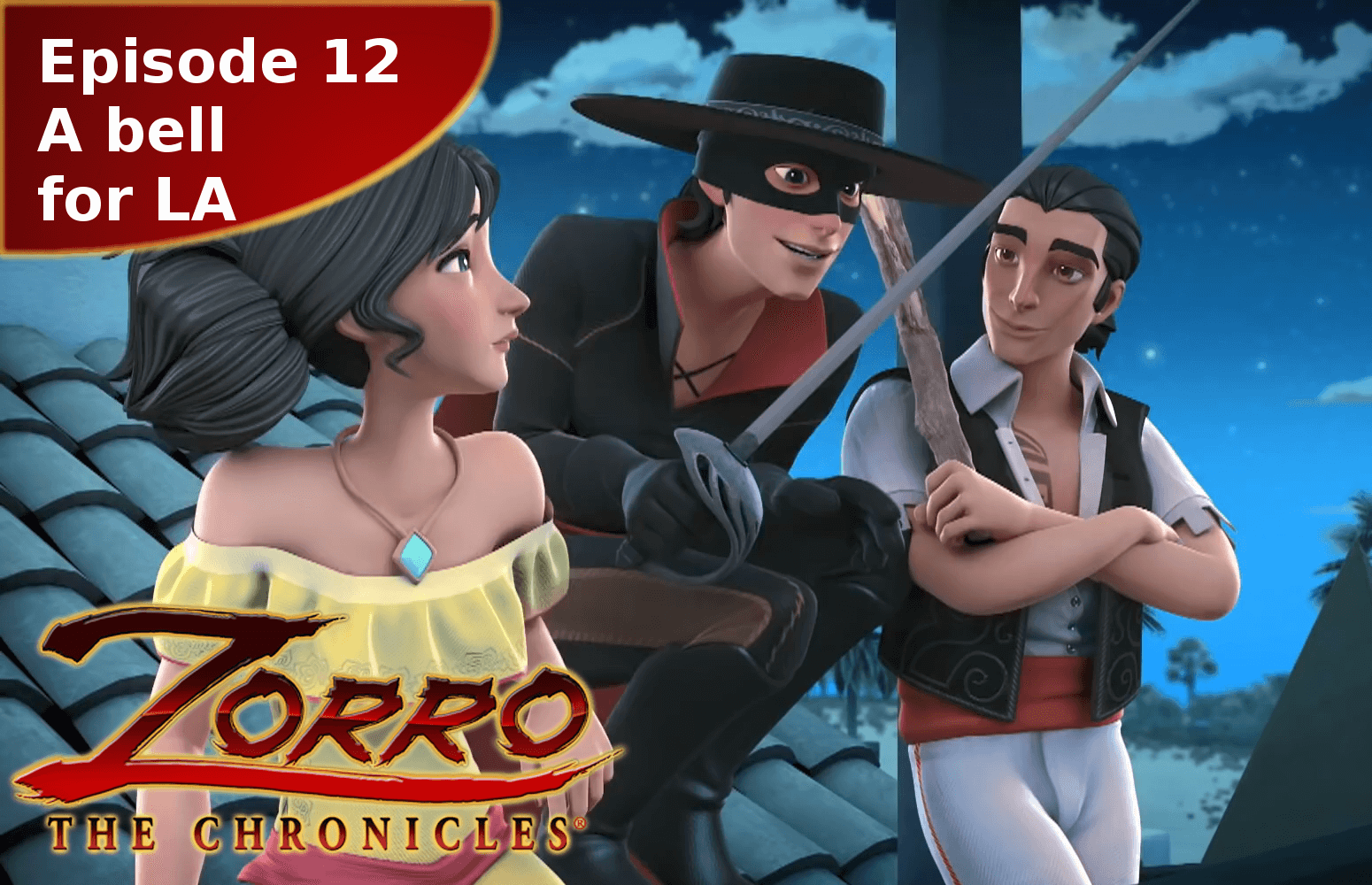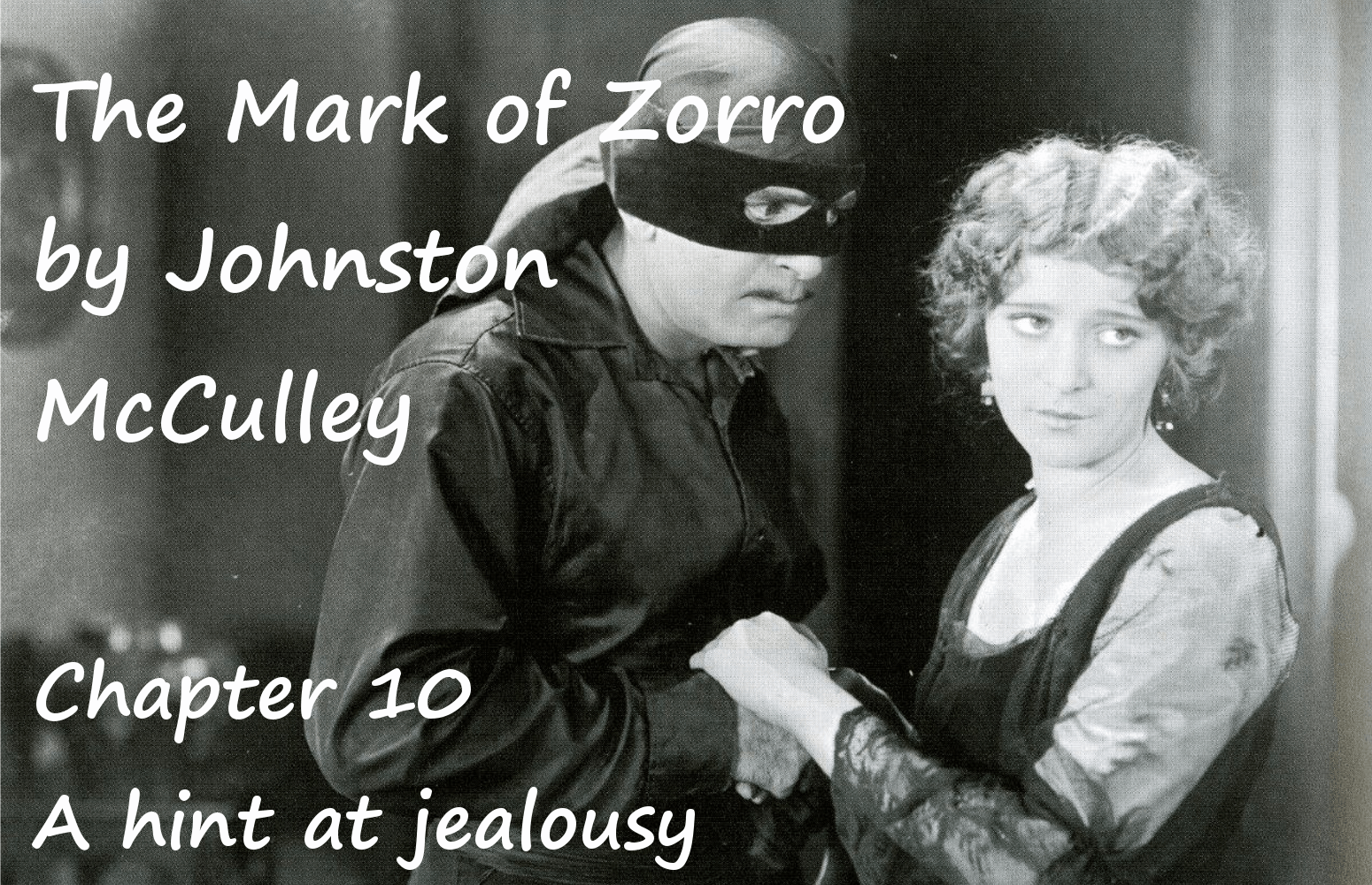The Mark of Zorro chapter 36 All against them
The Mark of Zorro chapter 36 All against them
Author McCulley, Johnston, 1883-1958
Title The Mark of Zorro
Note Published serially under the title: The curse of Capistrano.
Language English
Copyright Status Public domain in the USA.
And he rushed into danger!
The dawn had come; the first pink streaks had appeared in the eastern sky, and then the sun had risen quickly above the heights to the east, and now the plaza was bathed in brilliance. There was no mist, no high fog even, and objects on the hillsides far away stood out in relief. It was no morning in which to ride for life and freedom.
Señor Zorro had delayed too long with the governor and comandante, else had misjudged the hour. He swung into his saddle and urged his beast out of the patio—and then a full realization of his imminent peril came to him.
Down the trail from San Gabriel came Sergeant Pedro Gonzales and his troopers. Down the Pala road came another detachment of soldiers that had been trailing the caballeros and Don Carlos and had given up in disgust. Over the hill toward the presidio came the third body of men, who had been in chase of those who had rescued the Doña Catalina. Señor Zorro found himself hemmed in by his foes.
The Curse of Capistrano deliberately stopped his horse and for a moment contemplated the outlook. He glanced at the three bodies of troopers, estimated distance. And in that instant one with Sergeant Gonzales’s detachment saw him, and raised the alarm.
They knew that magnificent horse, that long purple cloak, that black mask and wide sombrero! They saw before them the man they had been pursuing throughout the night, the man who had made fools of them and played with them about the hills and valleys. They feared the rage of his excellency and their superior officers, and in their hearts and minds was determination to capture or slay this Curse of Capistrano now as this last chance was offered them.
Señor Zorro put spurs to his horse and dashed across the plaza, in full view of some score of citizens. Just as he did that, the governor and his host rushed from the house, shrieking that Señor Zorro was a murderer and should be taken. Natives scurried like so many rats for shelter; men of rank stood still and gaped in astonishment.
Señor Zorro, having crossed the plaza, drove his horse at highest speed straight toward the highway. Sergeant Gonzales and his troopers rushed to cut him off and turn him back, shrieking at one another, pistols in their hands, blades loosened in their scabbards. Reward and promotion and satisfaction were to be their lot if they made an end of the highwayman here and now.
Señor Zorro was forced to swerve from his first course, for he saw that he could not win through. He had not taken his pistol from his belt, but he had drawn his blade, and it dangled from his right wrist in such fashion that he could grip the hilt of it instantly and put it into play.
He cut across the plaza again, almost running down several men of rank who were in the way. He passed within a few paces of the infuriated governor and his host, darted between two houses, and rushed toward the hills in that direction.
It appeared that he had some small chance of escaping the cordon of his foes now. He scorned paths and trails, and cut across the open ground. From both sides the troopers galloped to meet him, flying toward the angle of the wedge, hoping to reach it in time and turn him back once more.
Gonzales was shouting orders in his great voice, and he was sending a part of his men down into the pueblo, so they would be in proper position in case the highwayman turned back again, and could keep him from escaping to the west.
He reached the highway and started down it toward the south. It was not the direction he would have preferred, but he had no choice now. He dashed around a curve in the road, where some natives’ huts cut off the view—and suddenly he pulled up his horse, almost unseating himself.
For here a new menace presented itself. Straight at him along the highway flew a horse and rider, and close behind came half a dozen troopers in pursuit!
Señor Zorro whirled his horse. He could not turn to the right because of a stone fence. His horse could have jumped it, but on the other side was soft, plowed ground, and he knew he could make no progress across it, and that the troopers might cut him down with a pistol bullet.
Nor could he turn to the left, for there was a sheer precipice down which he could not hope to ride with safety. He had to turn back toward Sergeant Gonzales and the men who rode with him, hoping to get a distance of a couple of hundred yards, where he could make a descent, before Gonzales and his men arrived at the spot.
He gripped his sword now, and was prepared for fight, for he knew it was going to be close work. He glanced back over his shoulder—and gasped his surprise.
For it was Señorita Lolita Pulido who rode that horse and was pursued by the half dozen troopers, and he had thought her safe at the hacienda of Fray Felipe. Her long black hair was down and streaming out behind her. Her tiny heels were glued to the horse’s flanks. She bent forward as she rode, holding the reins low down, and Señor Zorro, even in that instant, marveled at her skill with a mount.
“Señor!” he heard her shout.
And then she had reached his side, and they rode together, dashing down upon Gonzales and his troopers.
“They have been chasing me—for hours!” she gasped. “I escaped them—at Fray Felipe’s!”
“Ride close! Do not waste breath!” he screeched.
“My horse—is almost done—señor!”
Señor Zorro glanced aside at the beast, and saw that he was suffering from fatigue. But there was scant time to consider that now. The soldiers behind had gained some; those in front presented a lively menace that required deep consideration.
Down the trail they flew, side by side, straight at Gonzales and his men. Señor Zorro could see that pistols were out, and he doubted not that the governor had given orders to get him dead or alive, but to see that he did not escape again.
Now he spurred a few paces in advance of the señorita, and called upon her to ride his horse’s tracks. He dropped the reins on his mount’s neck, and held his blade ready. He had two weapons—his blade and his horse.
Then came the crash. Señor Zorro swerved his horse at the proper instant, and the señorita followed him. He cut at the trooper on his left, swung over and cut at the one on his right. His horse crashed into that of a third trooper, and hurled it against the animal the sergeant rode.
He heard shrill cries about him. He knew that the men who had been pursuing Señorita Lolita had run into the others, and that there was a certain amount of confusion, that they could not use blades for fear of cutting down one another.
And then he was through them, with the señorita riding at his side again. Once more he was at the edge of the plaza. His horse was showing signs of weariness, and he had gained nothing.
For the way to San Gabriel was not open, the way to Pala was closed, he could not hope to escape by cutting across soft ground, and on the opposite side of the plaza were more troopers, in saddle and waiting to cut him off, no matter in which direction he started.
“We are caught!” he shouted. “But we are not done, señorita!”
“My horse is stumbling!” she cried.
Señor Zorro saw that it was so. He knew that the beast could not make another hundred yards.
“To the tavern!” he cried.
They galloped straight across the plaza. At the door of the tavern the señorita’s horse staggered and fell. Señor Zorro caught the girl in his arms in time to save her from a hard fall, and, still carrying her, darted through the tavern door.
“Out!” he cried to the landlord and the native servant. “Out!” he shrieked to half a dozen loiterers, exhibiting his pistol. They rushed through the door and into the plaza.
The highwayman threw the door shut and bolted it. He saw that every window was closed except the one that fronted on the plaza, and that the board and skin coverings were in place. He stepped to the table and then whirled to face the señorita.
“It may be the end,” he said.
“Señor! Surely the saints will be kind to us!”
“We are beset by foes, señorita. I care not, so that I die fighting as a caballero should. But you, señorita—”
“They shall never put me in the foul carcel again, señor! I swear it! Rather would I die with you!”
She took the sheep-skinner’s knife from her bosom, and he caught a glance of it.
“Not that, señorita!” he cried.
“I have given you my heart, señor. Either we live together, or we die together!”



